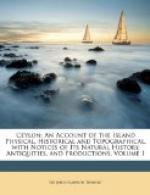[Footnote 1: I have seen with the sailors of the Maldives, who resort to Ceylon at the present day, charts evidently copied from very ancient originals.]
[Footnote 2: See the drawing, page 612.]
The next Venetian whose travels qualified him to speak of Ceylon was the Minorite friar ODORIC, of Portenau in Friuli[1], who, setting out from the Black Sea in 1318, traversed the Asian continent to China, and returned to Italy after a journey of twelve years. In Ceylon he was struck by the number of serpents, and the multitude of wild animals, lions (leopards?), bears, and elephants. “In it he saw the mountain on which Adam for the space of 500 years mourned the death of Abel, and on which his tears and those of Eve formed, as men believed, a fountain;” but this Odoric discovered to be a delusion, as he saw the spring gushing from the earth, and its waters “flowing over jewels, but abounding with leeches and blood-suckers.” The natives were permitted by the king to collect the gems; and in doing so they smear their bodies with the juice of lemons to protect them from the leeches. The wild creatures, they said, however dangerous to the inhabitants of the island, were harmless to strangers. In that island Odoric saw “birds with two heads,” which possibly implies that he saw the hornbill[2], whose huge and double casque may explain the expression.
[Footnote 1: Itinerarium Fratris ODORICI de Foro Julii de Portu-Vahonis.]
[Footnote 2: Buceros Pica. See ante, Part II. ch. ii. p. 167.]
In the succeeding century[1] the most authentic account of Ceylon is given by NICOLO DI CONTI, another Venetian, who, though of noble family, had settled as a merchant at Damascus, whence he had travelled over Persia, India, the Eastern Archipelago, and China. Returning by way of Arabia and the Red Sea, in 1444, he fell into danger amongst some fanatical Mahometans, and was compelled to renounce the faith of a Christian, less from regard for his own safety than apprehension for that of his children and wife. For this apostacy he besought the pardon of Pope Eugenius IV., who absolved him from guilt on condition that he should recount his adventures to the apostolic secretary, Poggio Bracciolini, by whom they have been preserved in his dissertation on “The Vicissitudes of Fortune."[2]




